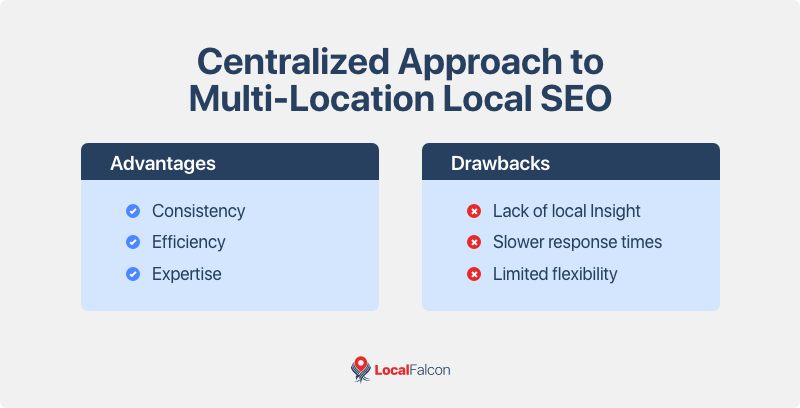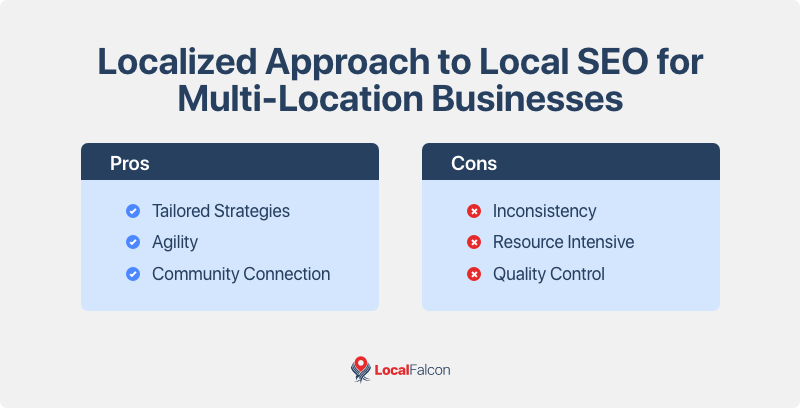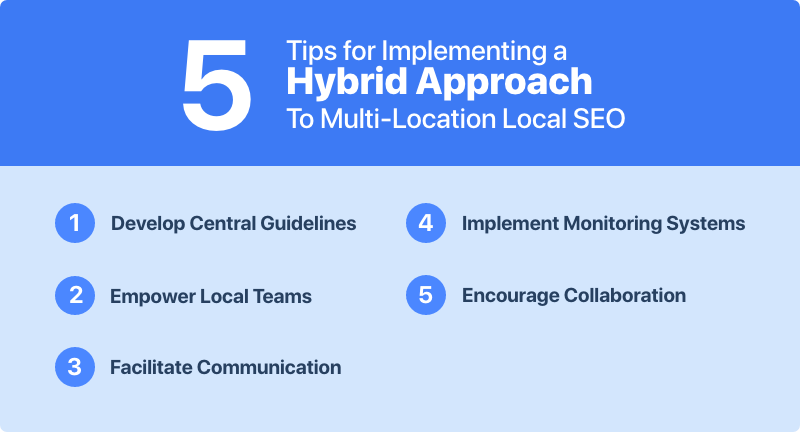Managing SEO for a business with multiple locations is one of the toughest and most rewarding challenges in local marketing. Each branch needs to rank in its own city or neighborhood, yet the brand must still feel unified, recognizable, and consistent everywhere it appears online.
That balance between central control and local flexibility is where many multi-location SEO strategies succeed or fail. Should your corporate marketing team handle everything from one place? Should local managers take the reins? Or is there a smarter hybrid approach that gives you the best of both worlds?
This guide explains how to manage SEO for multiple locations effectively, from Google Business Profiles to location pages, and explores when to centralize, localize, or blend your strategy for maximum visibility across every market you serve.
What Is Multi-Location SEO?
Multi-location SEO is the practice of optimizing a brand's online presence so that each physical location ranks prominently in its own local search results. It is essential for franchises, retail chains, and service-area businesses that operate in more than one city, region, or neighborhood.
Unlike single-location local SEO, multi-location SEO must balance two key goals:
-
Brand consistency: ensuring all locations share the same standards, voice, and trust signals.
-
Local relevance: optimizing each location's content, Google Business Profile, and citations to align with its unique community and audience.
When done correctly, this combination helps every branch of your business appear in local search packs, Google Maps, and AI-driven search experiences, which drives real-world results like calls, visits, and bookings.
Why Multi-Location SEO Matters for Franchises and Chains
For multi-location organizations, local SEO is one of the strongest growth levers available. Each additional optimized location effectively becomes another entry point for new customers.
Strong multi-location SEO can lead to:
-
Higher visibility in "near me" and map searches for every branch
-
Consistent brand presence across all online listings
-
More trust and engagement through localized content and reviews
-
Better analytics and decision-making by tracking performance per location
The challenge lies in how you manage it all. Whether you centralize SEO under corporate control or give local teams autonomy will have a major impact on your results, which brings us to the core strategic decision every multi-location business must make.
Centralized vs Localized SEO Approaches to Local SEO for Multiple Locations
When managing SEO for multiple locations, one of the most important decisions is how to organize responsibilities. Some brands handle all local SEO from a single corporate team, while others give each branch or franchise location control over its own strategy. There are clear advantages and disadvantages to both.
Centralized Local SEO
A centralized approach means that the corporate marketing or SEO team manages all optimization efforts for every location. This often includes content creation, Google Business Profile management, and review monitoring, all done from headquarters.
Advantages of a Centralized Approach:
-
Consistency: Ensures uniform branding, messaging, and data accuracy across every location.
-
Efficiency: Makes it easier to implement updates, track performance, and apply best practices.
-
Expertise: Gives all locations access to specialized SEO professionals and advanced tools.
Disadvantages of a Centralized Approach:
-
Limited Local Insight: Central teams may overlook local trends or customer nuances.
-
Slower Response Times: Handling reviews or local updates can take longer when everything runs through headquarters.
-
Less Flexibility: Local teams may feel constrained by corporate processes or approval steps.

Localized Local SEO
A localized approach gives individual locations control over their own SEO efforts. Local managers or marketing partners handle their Google Business Profiles, content, and reputation management, with minimal corporate oversight.
Benefits of a Localized Approach:
-
Local Relevance: Local teams understand their community's needs and can tailor content accordingly.
-
Faster Response: Local staff can quickly engage with customers and react to local trends or events.
-
Stronger Community Presence: Personalization helps each location feel like part of the local area rather than a generic chain.
Challenges of a Localized Approach:
-
Inconsistency: Messaging and branding may vary across locations.
-
Quality Control: Maintaining SEO standards and accuracy can be difficult without central oversight.
-
Resource Demands: Each location needs time, tools, and some level of SEO knowledge to execute effectively.

The Hybrid Model: A Balanced Multi-Location Local SEO Strategy
Many successful multi-location businesses adopt a hybrid SEO model. This approach combines central oversight with local execution, providing structure while allowing flexibility.
Tips for Implementing a Hybrid SEO Strategy:
-
Create clear brand and SEO guidelines for all locations.
-
Provide training and resources to empower local teams.
-
Maintain communication channels between local and central marketing teams.
-
Use a rank tracking platform such as Local Falcon to monitor performance across every market.
-
Encourage collaboration by sharing what works well at both the local and corporate levels.
A hybrid approach allows brands to maintain control over key SEO elements like structure and compliance, while still letting local teams add the authentic, community-focused touches that improve rankings and customer engagement.

Best SEO Strategies for Multi-Location Businesses
No matter which management model you choose, certain strategies are essential for success in multi-location SEO. These tactics help ensure that every branch of your business ranks well in local searches and delivers a consistent, trustworthy experience to customers online.
1. Optimize Every Google Business Profile
Each location should have its own verified and fully optimized Google Business Profile. Make sure the name, address, phone number, hours, and website link are correct (it's best to use a location-specific landing page URL). Select relevant categories, add photos, post updates, and encourage customers to leave reviews.
If you personally manage the GBP listings for multiple locations, use Google's bulk location management feature to streamline updates and maintain accuracy across all profiles.
2. Create Location-Specific Landing Pages
Give every location its own page on your website with unique, localized content. Include the branch's contact details, service area, and relevant keywords such as the city or neighborhood name. Add location photos, embedded Google Maps, and local reviews when possible.
These pages help search engines understand that your brand serves multiple distinct areas, while also improving user experience for local visitors.
3. Use Local Keywords Strategically
Incorporate location-based keywords in your metadata, headings, and on-page content. For example, use phrases like "plumber in [Neighborhood]" or "[City] family restaurant" where appropriate. Avoid keyword stuffing and focus on natural, helpful phrasing that matches how real people search.
4. Maintain Accurate Citations Across Directories
Consistency is crucial for local SEO, especially multi-location local SEO. Check that every location's information is correct and identical across directories such as Yelp, Tripadvisor, Apple Maps, Bing Places, and nich industry or local business listings. Even small variations or mistakes in your business name or address can hurt rankings and confuse customers.
5. Encourage and Respond To Local Reviews
Customer reviews are one of the strongest direct ranking signals for local search. Ask satisfied customers to leave feedback for their specific location and make sure to respond to all reviews promptly and professionally.
Consistent engagement shows Google and potential customers that your business is active and values local feedback.
6. Analyze and Monitor Each Location's Performance
Use a tool like Local Falcon to track local rankings, AI visibility, and competitor performance for each branch. This makes it easy to identify underperforming locations, spot issues like duplicate listings, and monitor the impact of updates.
Regular performance tracking also helps ensure that both local and central SEO efforts are aligned with overall brand goals.
7. Build Localized Content and Community Connections
Support local teams in creating blog posts, event pages, or social media content that highlights their community involvement. This builds stronger connections with customers and reinforces local relevance, which in turn boosts visibility.
For example, a restaurant chain might highlight regional menu specials, or a service business could feature customer success stories from specific neighborhoods.
By combining these strategies with a clear management framework, multi-location businesses can achieve both local and national visibility. Whether your SEO is centralized, localized, or hybrid, the key is consistency, transparency, and data-driven decision-making.
Conclusion
Managing SEO for multiple locations is not just about ranking in search results. It is about creating a scalable, consistent digital presence that feels local and relevant in every market you serve.
Whether you take a centralized, localized, or hybrid approach, the most effective strategy is the one that balances brand consistency with local authenticity. A well-structured central framework ensures your listings, data, and messaging stay accurate, while local input brings the nuance, engagement, and trust that drive conversions.
The future of multi-location SEO is increasingly data-driven and AI-influenced. As search experiences evolve beyond traditional rankings into conversational and map-based discovery, multi-location brands that invest in strong local visibility and continuous monitoring will have a major advantage.
Following best practices and using a multi-location rank tracking tool, such as Local Falcon, empowers both corporate and local teams, so your business can build a unified online presence that performs in every market, attracts more nearby customers, and strengthens your brand across all locations.
Frequently Asked Questions on Multi-Location Local SEO
What is multi-location SEO?
Multi-location SEO is the process of optimizing a brand's online presence so that each physical location ranks in local search results, maps, and directories.
Should I centralize or localize SEO for my multiple locations?
It depends on your resources and goals. Centralization ensures consistency, localization allows local nuance, and a hybrid approach often provides the best balance.
How do I optimize Google Business Profiles for multiple locations?
Ensure each location has a verified profile with accurate business information, photos, categories, and regular updates. Encourage local reviews and maintain a good review velocity for each branch.
How important are location-specific landing pages?
Very important. Unique landing pages for each branch improve local relevance, help search engines index each location, and increase conversions from local visitors.
How can I track SEO performance for all my locations?
Use multi-location local SEO tracking tools like Local Falcon to monitor rankings, citations, and visibility for each branch. Regular tracking helps identify underperforming locations.
Can duplicate listings harm my multi-location SEO?
Yes. Duplicate or inaccurate listings can confuse search engines and customers. Monitor your profiles and remove duplicates promptly to protect rankings.


